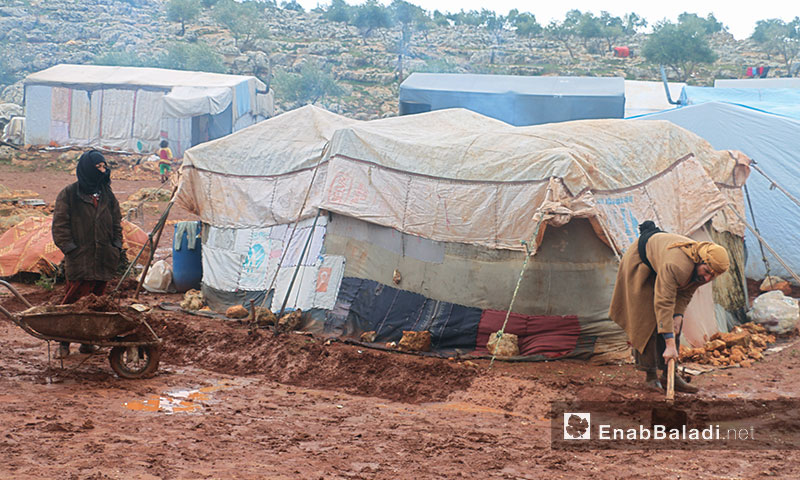



At first glance, you feel lost in a place that seems to lack the least form of organization. Tents are scattered everywhere, wherever you look and wherever you go tents surround you. To reach Hussain Hammadi’s tent, in the Atshan Camp at the Syrian-Turkish borders, you will definitely have to ask for directions.
We stood in front of a fuel merchant, in the middle of the camp, and asked for directions. He said: “Walk on the main road for 200 meters. Then, go right in a secondary street. There, you find alleyways; go into the second on the left. It is, then, the first tent to the right. Call Hussain and he’ll come out.”
The fuel merchant stopped talking while we were taken aback by shock, what roads he is talking about, and we are in a camp that has been built on agricultural lands consisting of soil only. We followed the merchant’s directions; the description was actually accurate. It felt like walking in an organized city, for merchants of all kinds spread along the main road, forming a market for the camp, which carried the name “Atshan” according to its residents, who came from the town of Atshan in the northern countryside of Hama.
Hussain Hammadi, a refugee who has been displaced from rural Hama to the border camps with Turkey, told Enab Baladi about the camp’s transformation phases in the past a few years, for he is one of the first refugees in the camp as he said.
“When we first arrived here, the area was almost empty of people and consisted of agricultural lands, just like other lands. We started erecting tens, which number did not exceed the hundred. We tackled things thinking that they will be temporary, and we did not set up the tents very well.”
“It is okay, leave [the tent] this way. We will return in a few days..this was what we told ourselves. However, the situation developed, and the few days turned into months, then into years. The tents were not enough anymore, and we were obliged to rearrange them. Little by little, the land was full of tents, their number continuously increased, and the camp changed to larger camps. It strived with displaced people,” Hussain said.
Soon, the life’s needs provided by the markets in the town of Atmeh, which was relatively far from the camp area, made the idea of opening a small shop an acceptable one. The thing began indeed with tent-based shops that offered their simple services to refugees.
The simple shops developed into markets that offered all necessities and formed an integral market in the camps. Therefore, the displaced people were no more forced to go to Atmeh.
To Enab Baladi, Emad al-Hassan, who was displaced from the area of al-Gab Plain in rural Hama, told us about his house which was destroyed during the battles in the area; he told the story in his tent that turned into a semi house after he built a room with stones and covered the land with concrete.
“At the beginning, we though that we will live in the camp for a few days, but years have past while we waited for the return. We were forced to adapt, search for jobs in the area and secure life’s needs. I actually did open a barber’s shop in the camp, which is now giving me a good income, enough for me and my family.” Emad said.
Emad kept talking with some inconsolable sensations that appeared clearly despite his attempts to hide them “we stopped thinking of going back to our houses. Our life is here; my relatives and my town’s people are all here. This is homeland, which is about the people not the land on which they live.”
Upon asking him if he would return to his house in al-Ghab Plain in case the war ended, Emad answered: “No one would return. People have established a new life here. Almost all of them have got jobs different from theirs prior to the revolution. The camp is developing and many of us have constructed homes that resemble their old ones, which they have been displaced from.”
Abbas Abdul Majid, displaced from the eastern countryside of Idlib, has a different perspective, for a person can never forget that he is living as a refugee in a camp and he or she has the right to return home.
“These days remind us of the Palestinian refugees’ camps in Syria before the revolution, for they also transformed into integral neighborhoods. Here, we are still in the camp, the war is still going on and our hope of the return exists at all times accompanied with patience.”
In Syria, there are a number of Palestinian camps that have been transformed into random overcrowded neighborhoods, most notably the Yarmouk Camp in Damascus, the al-Nayrab Camp in Aleppo and the Southern al-Ramel Camp in Lattakia.
“Palaces in exile do not suffices for the land’s soil and being displaced to here is exile within homeland. So, I urge and call all the refugees in the tents not to give up on the idea of the return. We would not suffer what the Palestinians have suffered; we will return despite everything.”
The northern Syrian-Turkish borders of Idlib governorate are considered a concentration point for a massive number of refugee camps. Many of these camps have turned into small towns and villages, which carry the names of their residents including Atshan and al-Ziara Camps, which have the names of the places from which people have been displaced, as if carrying their towns, villages and cities in their luggage.
if you think the article contain wrong information or you have additional details Send Correction